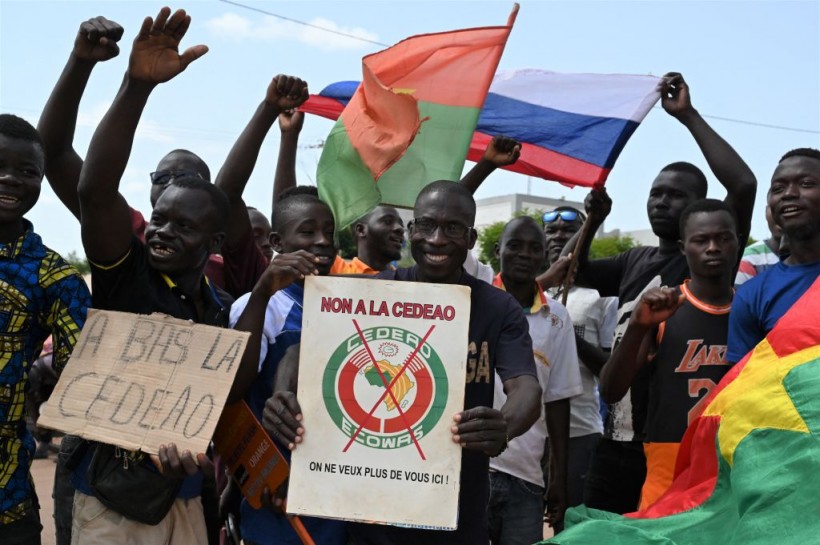The West African nations of Mali, Burkina Faso, and Niger have officially withdrawn from the Economic Community of West African States (ECOWAS), as announced by their respective military juntas on Sunday.
The decision, effective immediately, stems from the leaders' dissatisfaction with what they deem as "inhumane" sanctions imposed by ECOWAS in response to recent coups in their nations, as per ABC News.
West African Nations Withdraw From ECOWAS

A small group of protesters hold Russian and Burkina Faso flags as they protest against the Economic Community of West African States (ECOWAS), whose representatives are expected today in Ouagadougou on October 4, 2022. The Economic Community of West African States (ECOWAS) said on January 28, 2024 that Burkina Faso, Mali and Niger will be leaving the West African bloc.
Colonel Amadou Abdramane, spokesperson for Niger's junta, delivered a televised address, asserting that ECOWAS had deviated from the principles of its founding fathers. He claimed that the regional bloc failed to support the three countries in their ongoing struggle against terrorism and insecurity, characterized by persistent Islamist insurgencies.
In response to the withdrawal, ECOWAS released a statement, expressing surprise at the decision and noting that it had not received any formal notification from the three countries. The statement reiterated the bloc's commitment to restoring constitutional order and finding a negotiated solution to the political impasse.
The military juntas, which formed a mutual defense pact in September, have not outlined a clear timeline for a return to democratic governance. This announcement marks a significant escalation in tensions, particularly following the military coup in Niger in July, the last of the three nations to lose its democratic government.
The roots of this crisis trace back to the initial coup in Mali in 2020, followed by a subsequent one in 2021. Burkina Faso experienced similar upheaval with two military coups in 2022. The July coup in Niger, a vital security partner for the West, shocked the region, leading ECOWAS to impose sanctions and threaten military intervention to restore the elected president.
The juntas criticized ECOWAS for what they termed "illegitimate, inhumane, and irresponsible" sanctions, asserting that the trade restrictions had further weakened populations already battered by years of violence. The impact of the withdrawal on ECOWAS and the three nations' ability to maintain the free movement of goods and people within the region remains uncertain, according to The Washington Post.
West Africa Turns to Russia Amid ECOWAS Exit
In response to the security challenges in their countries, the military leaders ousted French troops, traditionally involved in counterterrorism efforts. Instead, they turned to Russia and Russian mercenaries, even as violence escalated sharply in the Sahel region. According to the Armed Conflict Location & Event Data Project, conflict fatalities from political violence in central Sahel rose by nearly 40 percent in 2023.
Despite facing sanctions and threats of military intervention, the military leaders have failed to provide a clear timetable for the restoration of constitutional rule. They have accused ECOWAS of being influenced by external powers and have severed military and cooperation ties with former colonial power France, opting for security support from Russia.
The decision to withdraw from ECOWAS raises questions about its impact on the 15-member regional bloc, particularly considering the free movement of goods and citizens historically enjoyed by its members. According to the bloc's treaty, member states wishing to withdraw must provide a written one-year notice. It remains unclear if the three countries have adhered to this process, and if so, they are required to abide by the treaty's provisions during the year-long withdrawal period.
Furthermore, the three nations are also members of the West African Monetary Union (UEMOA), which utilizes the West Africa CFA franc currency pegged to the Euro. Following the coups, ECOWAS leaders, in conjunction with the monetary union, restricted Mali and Niger's access to the regional financial market and the regional central bank. While Mali's access has been restored, Niger remains suspended, adding another layer of complexity to the evolving situation in the region, Reuters reported.
Related Article: Swedish PM Kristersson Willing to Meet Hungary's Orban to Finalize NATO Membership









